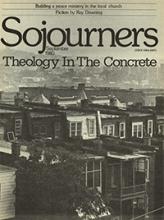The following article is excerpted from a presentation given by Perk Perkins, a pastor of Sojourners Fellowship and tenant organizer in our neighborhood, at the Second Congress on Urban Ministry in Chicago in April, 1980. The congress, which was sponsored by the Seminary Consortium for Urban Pastoral Education (SCUPE), brought together church and lay leaders from urban settings to raise issues, discuss theology, and envision ministry for the cities.--The Editors
The theology of the Bible is the response of faithful people to events and issues. My theology is being shaped and molded by my neighborhood and my city. But theology is more than a response to events. It is action arising from the foundation of biblical witness, church tradition, and a community of faith.
My growing understanding of the church is the foundation for my theology. Jesus' call to repent and to turn away from the destructive forces that dominated and permeated his society was followed by an invitation to be a part of a new society. When Jesus spoke of the kingdom of God being at hand, he was speaking of a new social reality that was manifesting itself in the world.
The new society of the kingdom of God attempts to incarnate the life of Christ in the world. The biblical metaphor of the body of Christ must be taken literally; the church actually becomes the presence of Christ in the world. This simply means that the incarnation of God in Christ continues in and through the life of the church.
The church has the task of being a new order of life, liberation, healing, and salvation in the world. It cannot be just another social institution; it must be a new social reality presenting an alternative way of life which will be in conflict with the prevailing culture.
Read the Full Article

